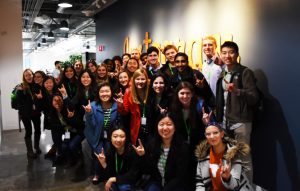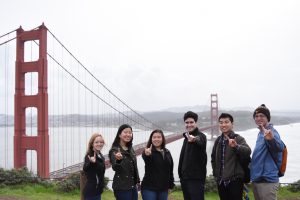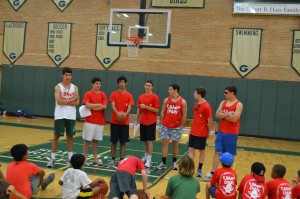Written by Michelle Zhang
This past weekend, BHP students traveled to San Francisco, California to tour tech giants Google, Facebook, and Adobe, and to see the sights. Despite the gloomy clouds and uncharacteristically rainy days, students enjoyed visiting company campuses, hearing from alumni panels, and taking in the laid-back California scene.

Visiting the Facebook office.
The first company visit was to Facebook, where they received a warm welcome from BHP and Plan II alumna Surveen Singh and were given a comprehensive tour of the Facebook campus. Designed by Disneyland engineers, the campus was illuminated by vibrant, colorful walls and typographic signs showing off the various restaurants and amenities available to employees (including a dentistry, barbershop, and dry cleaners!). Students were particularly excited to spend a few minutes in the arcade, stocked full of old-school games such as Street Fighter and Dance Dance Revolution. The tour concluded with an alumni meet-and-greet at the Sweet Shop, where students and BHP graduates chatted over plates of smores cupcakes and lemon poppyseed bars.

The group outside of the Google office.
Next on the list was Google, where alumna Elyse May provided a quick walk-around tour of the Googleplex campus. Immediately hit by the scent of the food trucks parked outside, students continued through the fields of lawn chairs and volleyball courts — all painted Google primary colors, of course — and past such eccentricities as a large-scale model of a dinosaur skeleton. Back in the building, an alumni panel greeted students and answered questions ranging from undergraduate degree focuses to work culture.
Last on the company visits was Adobe, where students got to see the clean, modern architectural layout of the offices and amenities. The tour showed off Adobe’s recreation center, which featured ping-pong tables and large television screens, as well as its affordable and delicious cafeteria. Students spent some time at the earthquake-proof skybridge, peering out over the San Francisco landscape, before heading into the employee panel full of representatives from departments ranging from HR to finance. After the panel, students munched on some light appetizers and networked at tables with the employees on the panel, getting to ask some more in-depth questions about their experiences at Adobe.

Students in front of the Golden Gate Bridge.
Afterwards, students headed off into the city on their own that Friday night and Saturday afternoon. Popular destinations included the Golden Gate Bridge, Haight-Ashbury district, Ghiradelli Square, and Chinatown. For dinner, students met up at Firenze by Night in Little Italy to enjoy a five-course meal with various BHP alumni working in the area.
Come Sunday, students left the vibrant Bay Area to head back home, now dreaming of summer internships in sunny San Francisco on the creative campuses of Facebook, Google, and Adobe. Thanks to HBA Financial Committee for putting on a great CFT!



